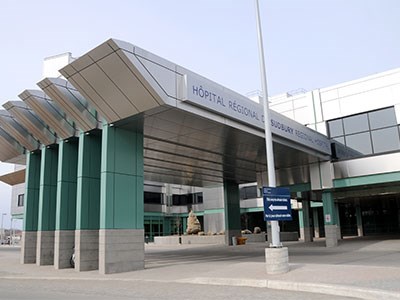Translated science for economic development. It’s the banner under which Dr. Francesco Diaz-Mitoma is leading a team of researchers to transform Sudbury into a premier Canadian biotechnological research centre with spinoffs that will translate into job creation for Northerners.
Diaz-Mitoma, vice-president of research at Health Sciences North, is heading up the Advanced Medical Research Institute of Canada (AMRIC), which incorporated as a non-profit organization in June 2011 and has already attracted a cadre of world-class researchers from across the country.
The aim, the doctor explained during a recent talk before the Greater Sudbury Chamber of Commerce, is to bring together scientists, researchers and technicians, along with industry and funders, to build on the research that is currently being done in Sudbury. The goal is twofold: improve the health of residents in Northern Ontario while creating spinoff companies operating in Sudbury.
“We’re building commercial opportunities, functioning almost like an incubator for new businesses and companies that exploit those research programs,” he said.
Research being done in Sudbury and across the country is being translated into development and licensing opportunities. One company, Ramsey Lake Pharma, is licensing antimicrobial molecules from a public company that is not developing the technology itself.
“We’re being very aggressive in terms of the creation of these spinoff companies because this is the opportunity that we’re seeing,” Diaz-Mitoma said. “Canada has invested billions of dollars in research, but we’re very bad in terms of translating that basic science into clinical applications.”
Research is focused on chronic conditions that affect Northern populations: heart failure, tobacco addictions—a vaccine for smoking cessation is currently under development—bacteria related to cancer, expertise in hospital infections, and cancer diagnostics and treatments, he said.
With AMRIC’s creation, Health Sciences North becomes one of two dozen academic research medical centres in the country. In its first year of operation, AMRIC had $2 million in operation funds; this year, the facility hopes to double that.
“We developed a research development caucus on developing grants, developing proposals to be able to attract funding for research to Sudbury,” he said.
AMRIC has partnered with the National Research Council and is looking to extend its partnerships nationally and internationally.
Although currently operating out of a 12,000-square-foot space at the hospital, Diaz-Mitoma said it’s not enough. He wants to build a stand-alone, 70,000-square-foot facility on the hospital site within the next four to five years, and said AMRIC will undergo a capital campaign to seek public and private donations for the project.
Under the current scheme, AMRIC will need the space. The organization plans to increase its research staff from four to 12 within the next three years, while simultaneously forming six new companies.
The new facility will provide for “the integration of clinical research and community practice, focusing on chronic disease and finding commercial applications that have the most potential for creating jobs locally,” Diaz-Mitoma said.
The doctor, who serves as CEO and chief scientist at AMRIC, said the economic impact of the new organization will be significant. Within four years, he hopes to have an annual operating budget of $24 million and 154 staff, 137 of them research-related.
He estimates the overall economic spinoff to Sudbury to be about $42 million to $48 million per year, rising to $250 million by the year 2020.
As AMRIC grows and strengthens its reputation as a world-class centre for medical research, Diaz-Mitoma expects it will continue to attract the best people to Sudbury.
“It will be an economic engine where there are continuous visitors and speakers presenting, increasing the knowledge of this lab at Health Sciences North,” he said.




